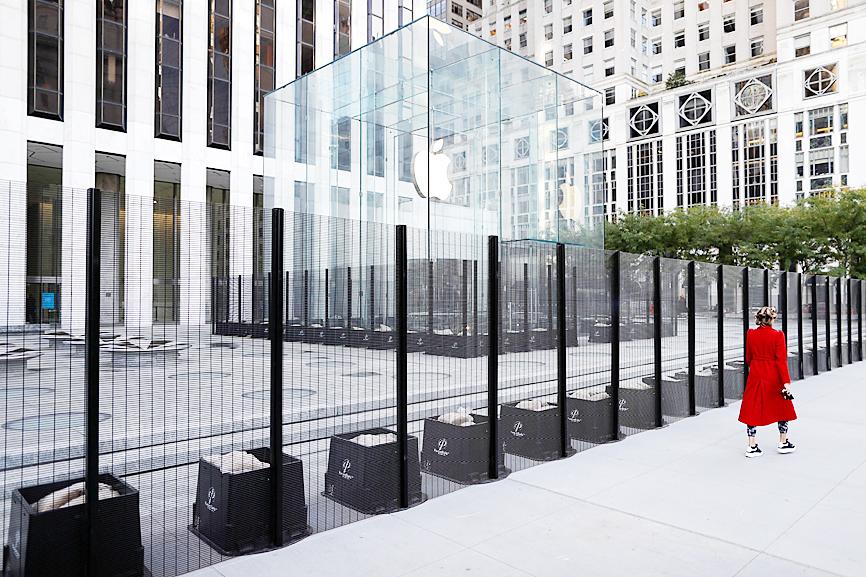Apple Inc is grappling with a shortage of vital chips that manage power consumption in iPhones and other devices, people with knowledge of the matter said, complicating its ability to meet holiday demand for the latest version of its marquee gadget.
It is unclear to what extent the bottleneck might limit iPhone availability during its crucial launch quarter, typically Apple’s busiest.
Despite the shortfall, suppliers are likely to prioritize Cupertino, California-based Apple and its power-hungry iPhone 12 over other customers lining up for scarce parts, said the people, who asked not to be identified discussing private matters.

Photo: Reuters
Increasing demand for silicon across a range of products and supply-chain disruptions from COVID-19 are the main causes of the shortage, the people said.
Main Apple chipmaker Taiwan Semiconductor Manufacturing Co (TSMC, 台積電) last month said that 5G smartphones require 30 to 40 percent more chip content versus 4G. That and uncertainty over the course of the pandemic is spurring customers to cache components for fear of running out, especially after major smartphone maker Huawei Technologies Co (華為) had stocked up massively ahead of a September deadline for US sanctions.
The stockpiling compounds lingering issues across a global electronics industry still recovering from rolling lockdowns that snarled transport routes and cut off workers from factories earlier this year. Disruptions are expected to persist over the next two quarters, the people said.
Power management is more important in the iPhone 12 than for its predecessors given additional camera features and 5G capabilities, increasing Apple’s need for these components. It recently launched four 5G models and analysts expect strong consumer demand for the devices.
During a recent conference call with analysts, Apple CEO Tim Cook warned about supply constraints for the iPhone 12, Mac, iPad and some Apple Watch models — although he did not specifically mention power-management chips.
Supply issues for the iPhone are “not a surprise” because Apple has just begun to ramp up production, Cook said.
“It’s hard to predict” how long the supply constraints will last, he added.
An Apple spokesman declined to comment.
Apple has multiple power management chip suppliers, according to a recent teardown from iFixit. The iPhone 12 Pro uses a component from Texas Instruments Inc to control power to the camera system, along with a similar chip from STMicroelectronics NV and one from Qualcomm Inc for the 5G modem.
There is also a power-management part designed by Apple in this handset. In 2018, Apple acquired technology and other assets from Dialog Semiconductor PLC for US$600 million to build its own power-management chips.
The disruption to iPhone production comes amid questions over Apple’s ability to galvanize demand for its newest gadget in China, following its worst quarterly revenue performance there since 2014.
Investors are concerned the company is losing momentum to homegrown rivals like Huawei and Xiaomi Corp (小米) in one of its most critical markets.

Merida Industry Co (美利達) has seen signs of recovery in the US and European markets this year, as customers are gradually depleting their inventories, the bicycle maker told shareholders yesterday. Given robust growth in new orders at its Taiwanese factory, coupled with its subsidiaries’ improving performance, Merida said it remains confident about the bicycle market’s prospects and expects steady growth in its core business this year. CAUTION ON CHINA However, the company must handle the Chinese market with great caution, as sales of road bikes there have declined significantly, affecting its revenue and profitability, Merida said in a statement, adding that it would

i Gasoline and diesel prices at fuel stations are this week to rise NT$0.1 per liter, as tensions in the Middle East pushed crude oil prices higher last week, CPC Corp, Taiwan (台灣中油) and Formosa Petrochemical Corp (台塑石化) said yesterday. International crude oil prices last week rose for the third consecutive week due to an escalating conflict between Israel and Iran, as the market is concerned that the situation in the Middle East might affect crude oil supply, CPC and Formosa said in separate statements. Front-month Brent crude oil futures — the international oil benchmark — rose 3.75 percent to settle at US$77.01

RISING: Strong exports, and life insurance companies’ efforts to manage currency risks indicates the NT dollar would eventually pass the 29 level, an expert said The New Taiwan dollar yesterday rallied to its strongest in three years amid inflows to the nation’s stock market and broad-based weakness in the US dollar. Exporter sales of the US currency and a repatriation of funds from local asset managers also played a role, said two traders, who asked not to be identified as they were not authorized to speak publicly. State-owned banks were seen buying the greenback yesterday, but only at a moderate scale, the traders said. The local currency gained 0.77 percent, outperforming almost all of its Asian peers, to close at NT$29.165 per US dollar in Taipei trading yesterday. The

RECORD LOW: Global firms’ increased inventories, tariff disputes not yet impacting Taiwan and new graduates not yet entering the market contributed to the decrease Taiwan’s unemployment rate last month dropped to 3.3 percent, the lowest for the month in 25 years, as strong exports and resilient domestic demand boosted hiring across various sectors, the Directorate-General of Budget, Accounting and Statistics (DGBAS) said yesterday. After seasonal adjustments, the jobless rate eased to 3.34 percent, the best performance in 24 years, suggesting a stable labor market, although a mild increase is expected with the graduation season from this month through August, the statistics agency said. “Potential shocks from tariff disputes between the US and China have yet to affect Taiwan’s job market,” Census Department Deputy Director Tan Wen-ling